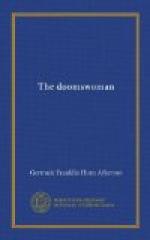For a time there was no conversation, only a series of exclamations. Chonita alone was calm, smiling a loving welcome. In the excitement of the first moments little notice was taken of the devoted bailer, who ardently regarded Chonita.
Don Juan de la Borrasca was flouting his sixties, fighting for his youth as a parent fights for its young. His withered little face wore the complacent smile of vanity; his arched brows furnished him with a supercilious expression which atoned for his lack of inches,—he was barely five feet two. His large curved nose was also a compensating gift from the godmother of dignity, and he carried himself so erectly that he looked like a toy general. His small black eyes were bright as glass beads, and his hair was ribboned as bravely as Reinaldo’s. He was clad in silk attire,—red silk embroidered with butterflies. His little hands were laden with rings; carbuncles glowed in the lace of his shirt. He was moderately wealthy, but a stanch retainer of the house of Iturbi y Moncada, the devoted slave of Chonita.
She was the first to remember him, and held out her hand for him to kiss. “Thou hast the gratitude of my heart, dear friend,” she said, as the little dandy curved over it. “I thank thee a thousand times for bringing my brother back to me.”
“Ay, Dona Chonita, thanks be to God and Mary that I was enabled so to do. Had my mission proved unsuccessful I should have committed a crime and gone to prison with him. Never would I have returned here. Dueno adorado, ever at thy feet.”
Chonita smiled kindly, but she was listening to her brother, who was now expatiating upon his wrongs to a sympathetic audience.
“Holy heaven!” he exclaimed, striding up and down the room, “that an Iturbi y Moncada, the descendant of twenty generations, should be put to shame, to disgrace and humiliation, by being cast into a common prison! That an ardent patriot, a loyal subject of Mexico, should be accused of conspiring against the judgment of an Alvarado! Carillo was my friend, and had his cause been a just one I had gone with him to the gates of death or the chair of state. But could I, I, conspire against a wise and great man like Juan Bautista Alvarado? No! not even if Carillo had asked me so to do. But, by the stars of heaven, he did not. I had been but the guest of his bounty for a month; and the suspicious rascals who spied upon us, the poor brains who compose the Departmental Junta, took it for granted that an Iturbi y Moncada could not be blind to Carillo’s




